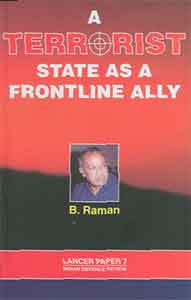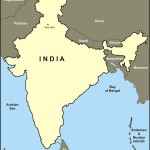India faces constraints due to Pakistan being a nuclear power and the conventional asymmetry in India’s favour being not as great as in the case of the US and Israel. Keeping these constraints in view, an appropriate response for India would be a mix of continued diplomatic offensive to have international sanctions imposed against Pakistan and a simultaneous undeclared policy of economic and para-military retaliatory options.
Indias policy till now has been to rely essentially on the political and diplomatic options. It needs to be examined whether the time has come for bringing the para-military and military options into our counter-terrorism tactical repertoire”¦
A credible counter proxy war strategy against Pakistan has to have an overt and a covert component. The overt component relates to extending political, moral and diplomatic support to the alienated sections of PoK and the Northern Areas (NA) in their agitations/ struggle against the Government of Pakistan. Islamabad goes to the world promptly with exaggerated accounts of every incident taking place in J&K in order to keep the issue constantly in the media and before international public opinion. At the same time, it has imposed a virtual iron curtain on developments in PoK and the NA in order to keep world media and public opinion in the dark about the real situation there.
For nearly two years the world was not aware of the massacre of the Shias in Gilgit in 1988 by the tribal hordes of bin Laden instigated by Musharraf. The world was ignorant of the demonstrations all over PoK in 2000 against the proposal of the military junta to raise the height of the Mangla dam to benefit the farmers of Punjab. Amnesty International’s report on the Pakistani ban on pro-independence groups/ individuals contesting elections in PoK has hardly received any publicity.
The policies followed by the Zia and the Musharraf regimes of settling Punjabi and Pakhtoon ex-servicemen in the NA in order to weaken the nationalist forces there are hardly known even in the rest of Pakistan. The outbreak of sectarian riots in Gilgit in the second fortnight of June before Musharrafs visit to India and the way, after Agra, Musharraf forced the PoK Assembly to elect Maj Gen Mohammed Anwar Khan, the Vice Chief of the General Staff in the GHQ, as the President of the PoK after he had prematurely retired from the Army to contest the election have not been brought to the attention of the world.
| Editor’s Pick |
The world does not know that the PoK Assembly does not have any financial powers, that the budgets are prepared in Islamabad, that the Chief Secretary and other senior officials of the NA are either Punjabis or Pakhtoons, that the people of the NA have never participated in the elections to Pakistan’s National Assembly and that they are governed even today as the frontier tribals of British India were before independence by the Frontier Crime Regulations promulgated by the British colonial masters, under which no native of the NA can move from one village or city to another without the permission of the police and has to register himself or herself with the police during such movements.
The world does not know that the PoK Assembly does not have any financial powers, that the budgets are prepared in Islamabad”¦
After 1988, a number of new organisations came up in the PoK and the NA demanding greater democracy, autonomy and even independence, but the ISI has ruthlessly suppressed them keeping their leaders under detention without trial. Those, who escaped arrest, are living in exile abroad.
India claims that the entire J&K as it existed before August 15, 1947, is an integral part of India and, yet, our political leadership, bureaucracy and public opinion have taken no interest in the plight of the peoples there and in bringing to the attention of the world what has been happening behind the iron curtain erected by Islamabad.
 One has the impression that New Delhi is as ignorant about the state of affairs on the other side of the Line of Control (LoC) as the rest of the world. It has taken little notice of the emerging new leadership in the POK and the NA and has avoided interactions with the political exiles from these areas living abroad. No attempt has been made to better organise them in their struggle against Islamabad. We have every moral right to do so if we consider the PoK and the NA as rightfully belonging to us.This tragic neglect has to be put an end to as part of the overt component of the proposed counter proxy war policy. What should be the contours of the covert component cannot be discussed in a study like this, but certain points can be flagged. It has to be based on a recognition of certain ground realities such as the following:
One has the impression that New Delhi is as ignorant about the state of affairs on the other side of the Line of Control (LoC) as the rest of the world. It has taken little notice of the emerging new leadership in the POK and the NA and has avoided interactions with the political exiles from these areas living abroad. No attempt has been made to better organise them in their struggle against Islamabad. We have every moral right to do so if we consider the PoK and the NA as rightfully belonging to us.This tragic neglect has to be put an end to as part of the overt component of the proposed counter proxy war policy. What should be the contours of the covert component cannot be discussed in a study like this, but certain points can be flagged. It has to be based on a recognition of certain ground realities such as the following:
India claims that the entire J&K as an integral part of India and, yet, our political leadership, bureaucracy have taken no interest in the plight of the peoples there and in bringing to the attention of the world what has been happening behind the iron curtain erected by Islamabad.
- Ideas such as the right of hot pursuit, raids on training camps across the LoC, etc, will not work. Hot pursuit can work against terrorists/insurgents indulging in hit and run raids from rear bases across the border. There cannot be any hot pursuit of terrorists operating from shelters inside our territory and against suicide bombers. The question of raids on training camps across the LoC does not arise because the camps are located on either side of the Pakistan-Afghanistan border and not in the PoK or the NA.
- Covert actions against the Pakistani interests in the PoK and the NA would be difficult because of the strong presence of a Punjabi-Pakhtoon component (mostly ex-servicemen) in the local population. Even before 1947, the present PoK had a strong Punjabi presence and this has increased since then due to the systematic resettling of Punjabi and Pakhtoon ex-servicemen. The NA had very little Punjabi-Pakhtoon component before 1947 except in the areas in the proximity of the NWFP. Today, Punjabis and Pakhtoons are economically dominant, though not yet numerically.
- Pakistan has the advantages of terrain and local support in this region and, therefore, will be able to frustrate any covert actions without serious difficulties.
Hence, the epicentre of the covert component of any counter proxy war policy has to be largely outside the PoK and the NA, in areas where we will have the advantages of ground conditions and local support. We have to carefully choose the terrain, which will hurt Pakistan and hurt it badly.




